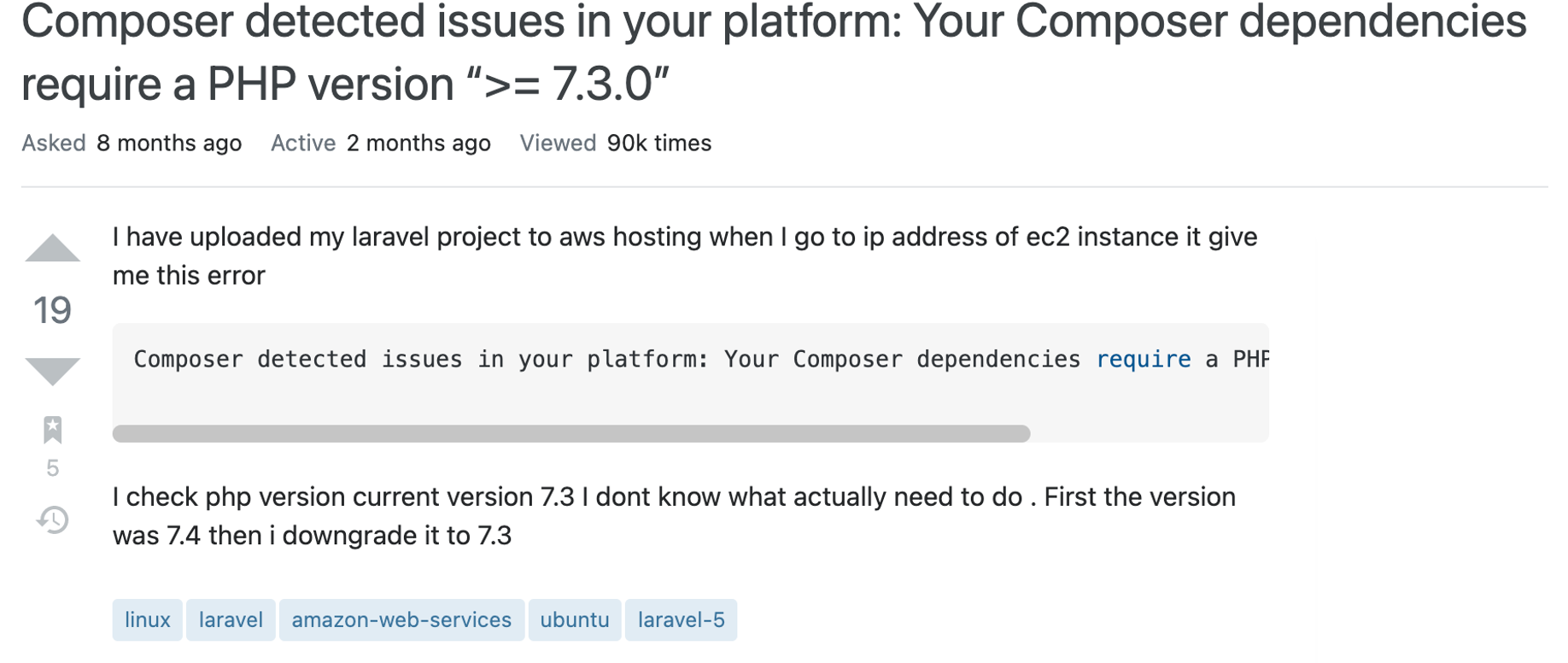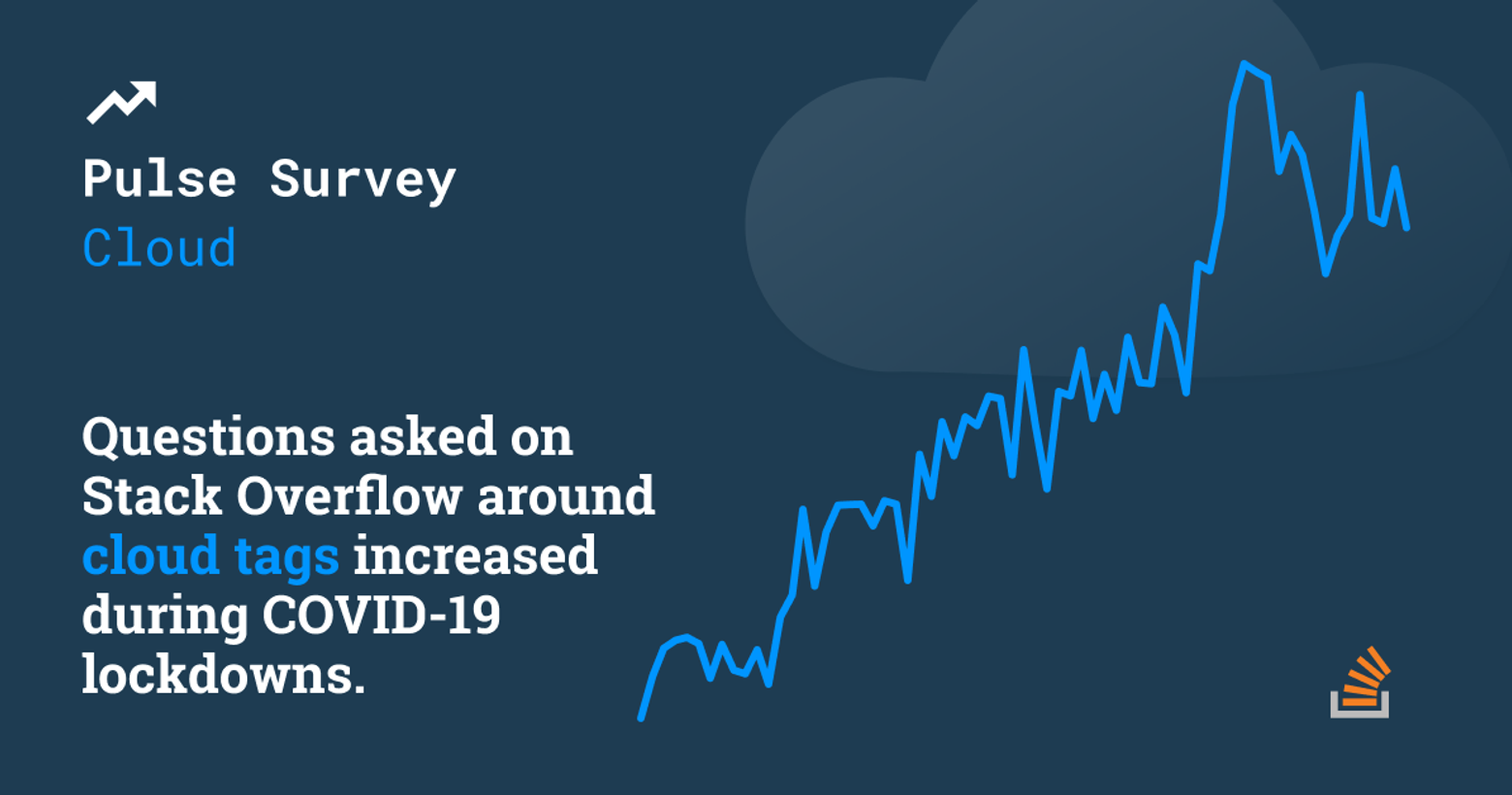Welcome to our second Stack Overflow Knows pulse survey. In our first edition, we focused on blockchain technologies. This time, we are shifting our focus to the cloud. We will be running these smaller surveys every few months as a complement to our annual Developer Survey to allow us to dive deeper into specific topics. If you have a suggestion for what we should explore next, email us or share on social with the hashtag #StackOverflowKnows.
Cloud adoption skyrockets
The migration from localized to cloud computing has been accelerating for more than a decade, so perhaps it’s no surprise that 90% of respondents to our latest survey indicated that their companies increased usage of the cloud over the last year. It was a global phenomenon, with every region showing at least 75% of its participants growing their cloud adoption. While we know that the pandemic accelerated many aspects of digital transformation, we wanted to see if we could make an educated guess at exactly how big of a leap forward the worldwide lockdowns precipitated.
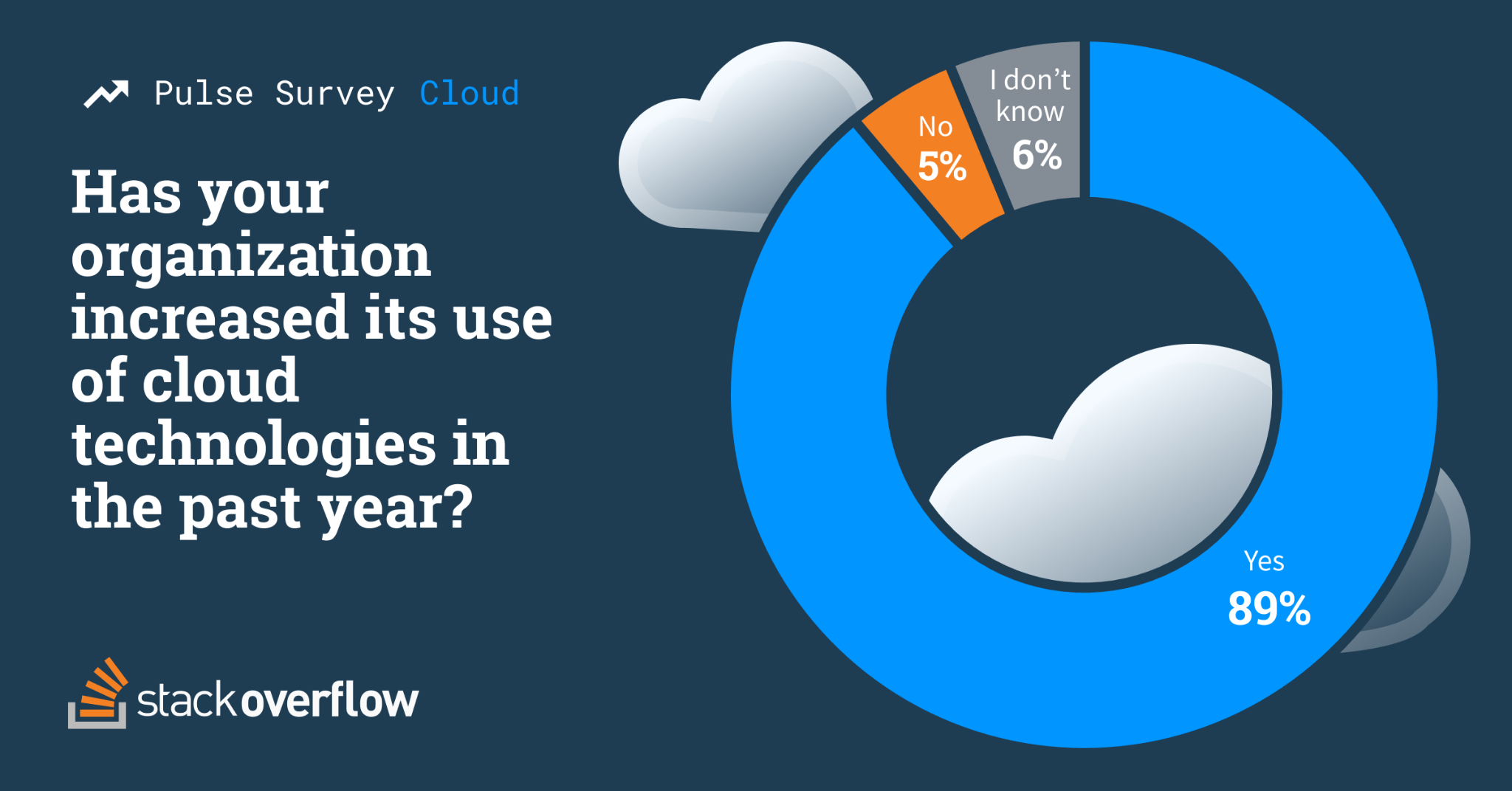
So, how can we quantify this acceleration? Well, the response to our survey matched a trend seen in the activity on our public site. Before the pandemic, users were asking a little over 6,000 cloud related questions each month. The number of monthly questions related to the cloud grew by about 500 questions per year between 2018 and 2020. When lockdowns began across 100 countries in March of 2020, however, we saw an enormous spike, with average questions per month peaking around 8,000 by the end of that month and remaining near that level through the end of 2020. We saw about four years worth of our average annual growth, in other words, in the span of just three months.
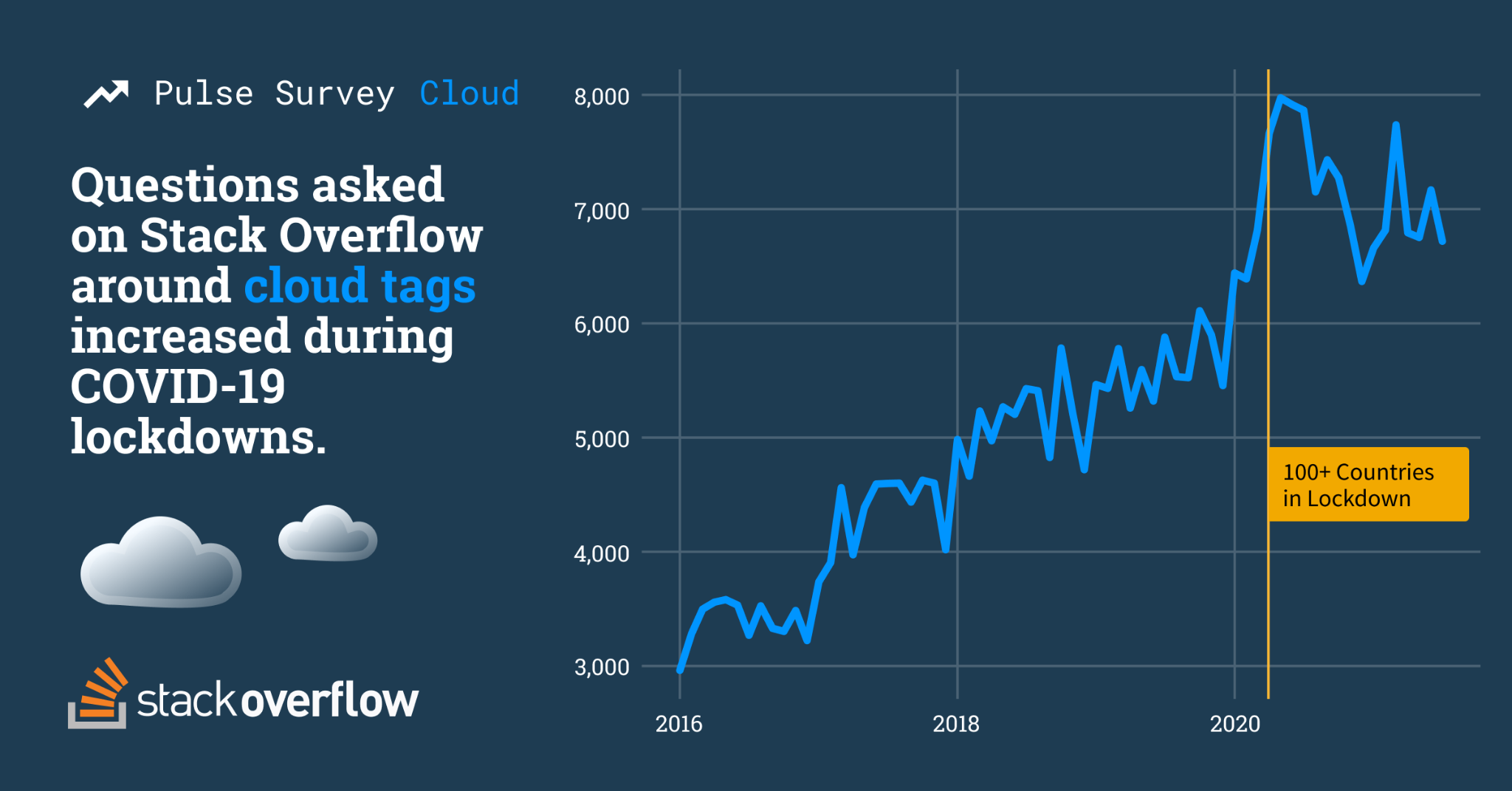
Because so many developers use Stack Overflow each week for work, we can look at this activity as a proxy for what was happening inside of companies around the globe. A massive uptake of new tools led to a tsunami of new questions, and this elevated level of collaboration on the platform lasted over a year. As we enter the final quarter of 2021, however, the tide is clearly ebbing, and total question volume is roughly where you would expect if the growth trend prior to the pandemic had held steady. There are currently over 250,000 questions about the top three cloud providers - AWS, Azure, and Google Cloud - across Stack Overflow.
What if COVID-19 never happened?
There is an obvious spike around cloud related tags in the early days of COVID-19. This is likely due to organizations transitioning to remote work. But what if none of this happened? By using historical data and a Bayesian structural time-series model we can predict what the count of questions asked on Stack Overflow would look like after February 2020 sans pandemic.
If there was no shift to remote work, we would have expected to see an average of 6.20K questions asked per month, totaling 111.52K from February 2020 to September 2021. Instead, we observed an average of 7.13K questions asked per month, totaling 128.35K. In relative terms, this is an increase of +15% which is likely due to remote work and unlikely to be due to random fluctuations.
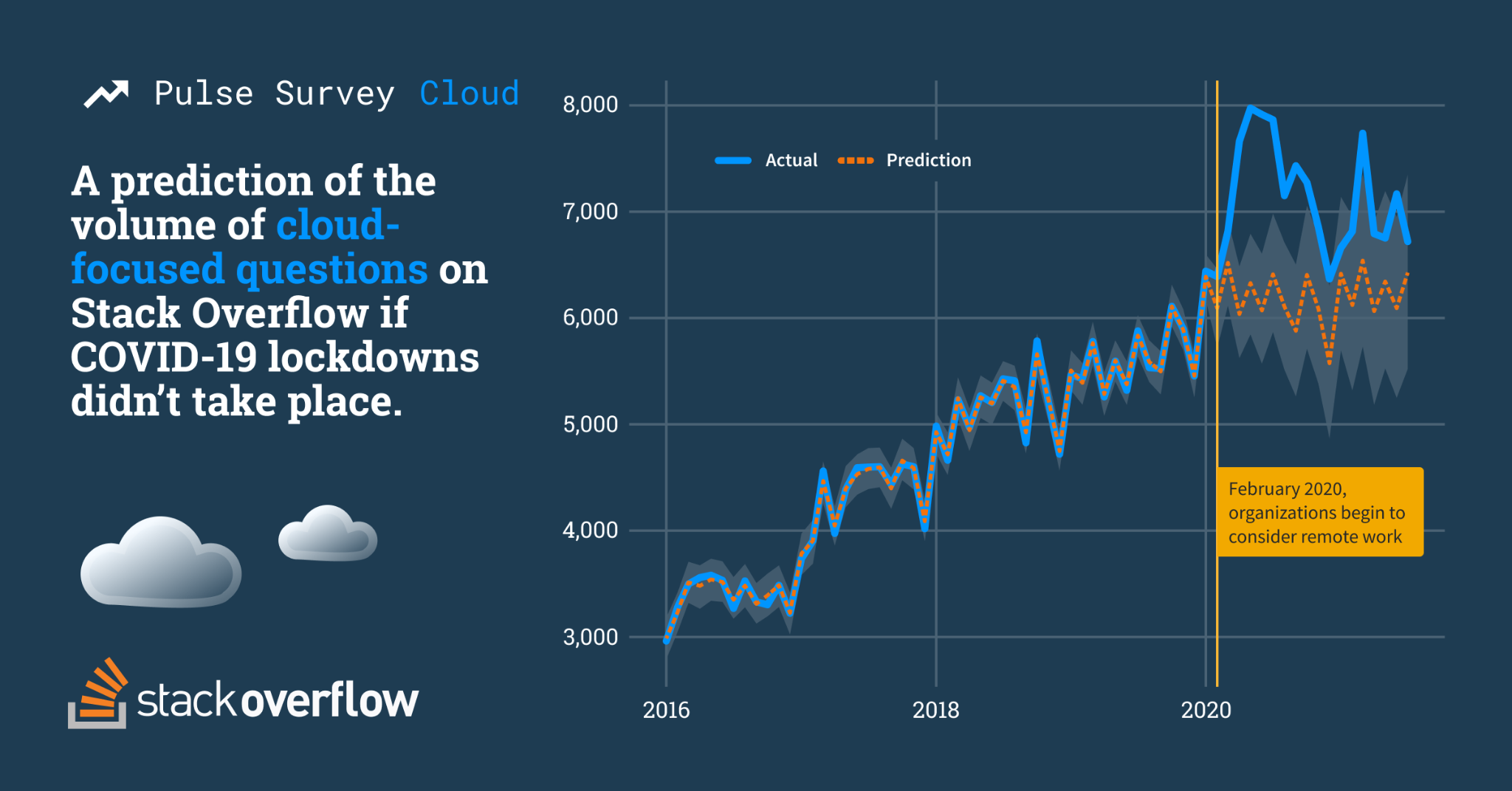
Types of clouds
“Out of the box” public clouds appear to be the most common among developers.
- Public clouds run on server architecture that’s delivered via the internet and shared across organizations. Multiple organizations can run on the same server hardware, which is referred to as multitenancy. Examples include AWS, Microsoft Azure, and Google Cloud.
- Private clouds run on servers dedicated solely to a single organization, whether the servers are on the organization’s premises (on-prem) or in a distant data center. Computing resources still grow and shrink according to need, but there are never two cloud instances on the same hardware.
- Hybrid cloud is any environment that uses a combination of both public and private clouds. The definitions for hybrid clouds vary; some consider any system with two clouds of any type—two public clouds, for example—as hybrid, while others have defined it as a mix of cloud and on prem servers.
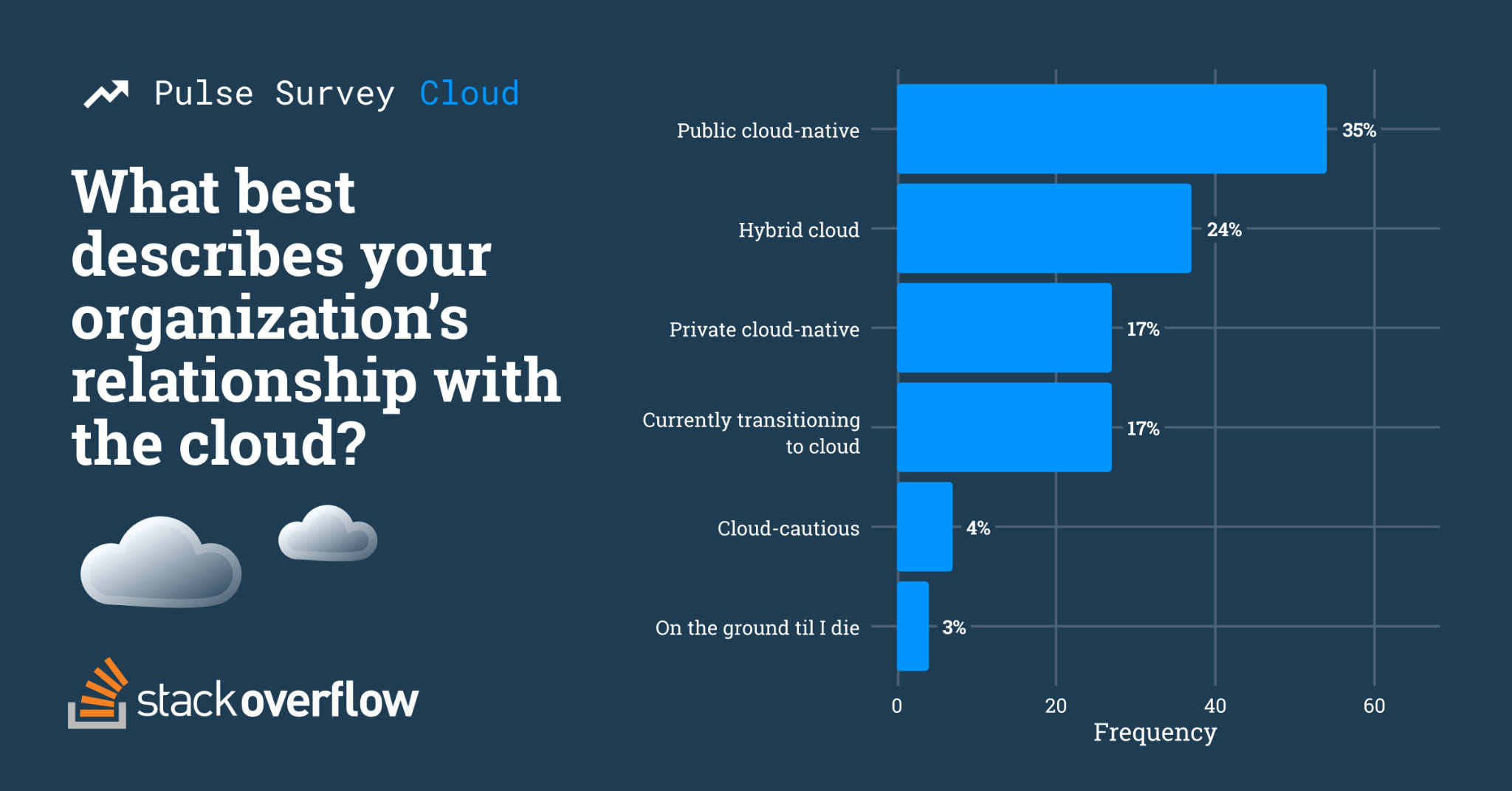
Just like we’re seeing hybrid work environments becoming the wave of the future, hybrid cloud environments are the most popular among respondents, particularly those working for large organizations. Smaller organizations are most likely to have used a public cloud, while larger organizations with 7500+ are most likely to have a hybrid cloud. Perhaps this indicates that startups are using public clouds to iterate and grow, while larger organizations look to move more of their data to more secure private or on premises servers.
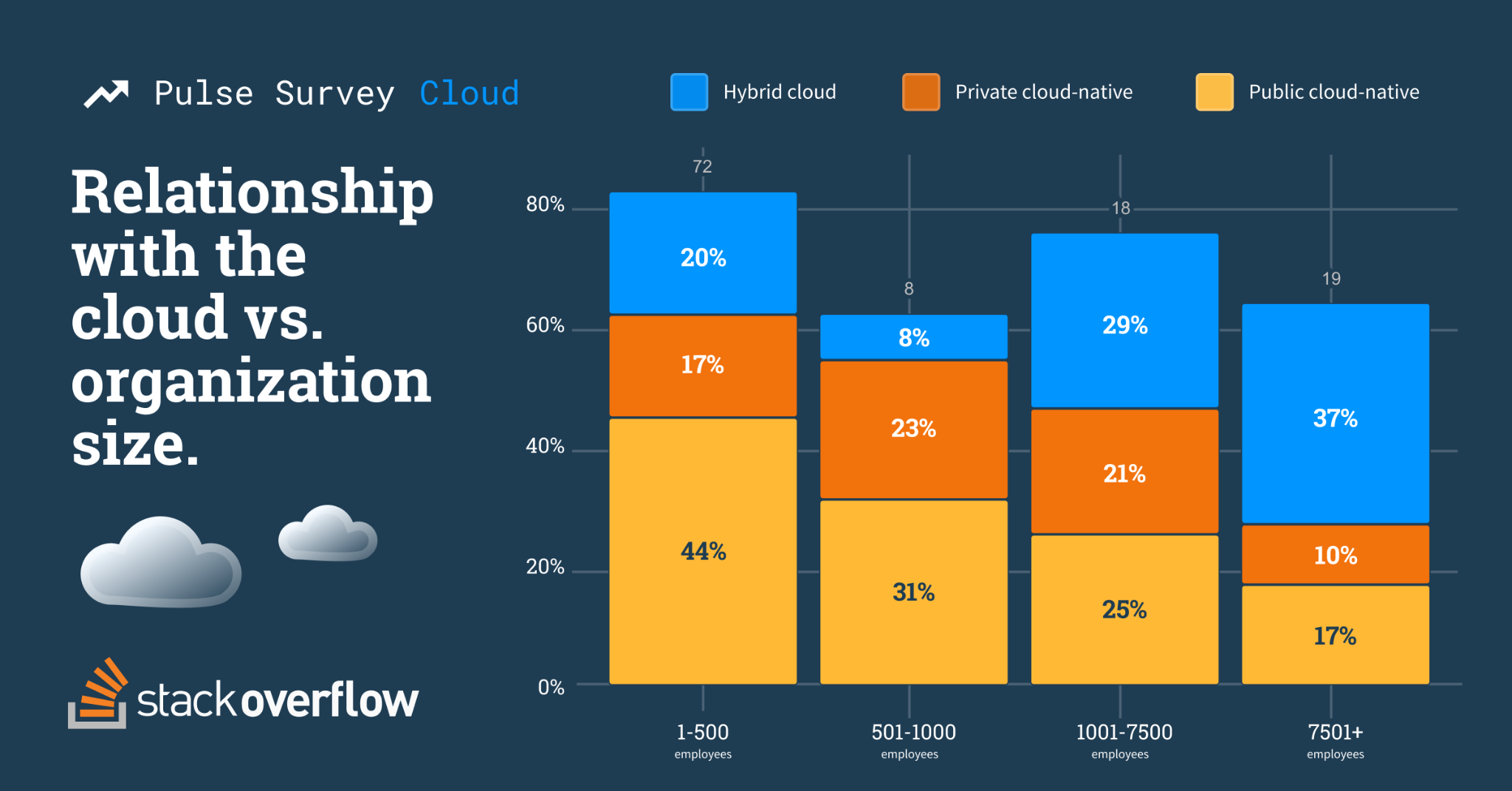
Who’s developing for the cloud?
We saw a fairly even split between those developing for the cloud (42%), and those who don’t (39%). When you combine those who do with those who want to (19%), however, developers interested in the cloud become a clear majority.
Those developing for the cloud are most likely doing it in a professional environment (73%). In contrast, very few are developing for the cloud as a student (3%). Not an unexpected result—cloud computing comes with recurring monthly charges, so hobbyists (22%) and students are less likely to have the resources to develop there.

Conclusion
A massive digital transformation happening in such a short span of time is bound to bring new challenges. Recent research found that “...since early 2020, remote employees reported that skills involving cloud computing, cybersecurity, and data storage were most lacking in their daily routines. The report also found that most remote employees' confidence to do their current jobs was down 13% from a year ago as office adjustments were made.” We hope those in need of help can find great questions and answers to support them on Stack Overflow. What kind of questions are visitors engaging with when it comes to the cloud? For curious readers, we included three of the most popular questions from the last year below.
The most viewed cloud questions in 2021
We already mentioned above that COVID-19 accelerated cloud migration, but what where people asking about? One way of answering that questions would be to look at the most viewed cloud related questions this year. Below we show the most viewed cloud questions for the top three cloud providers, Azure, Google Cloud Platform and Amazon Web Services.
Azure
Total Views: 166,719
The most viewed cloud-related question on Stack Overflow this year belongs to Azure, specifically Azure Virtual Machines. Although this question was asked over eight years ago, it continues to help developers every day.
Why am I getting “Cannot Connect to Server - A network-related or instance-specific error”?
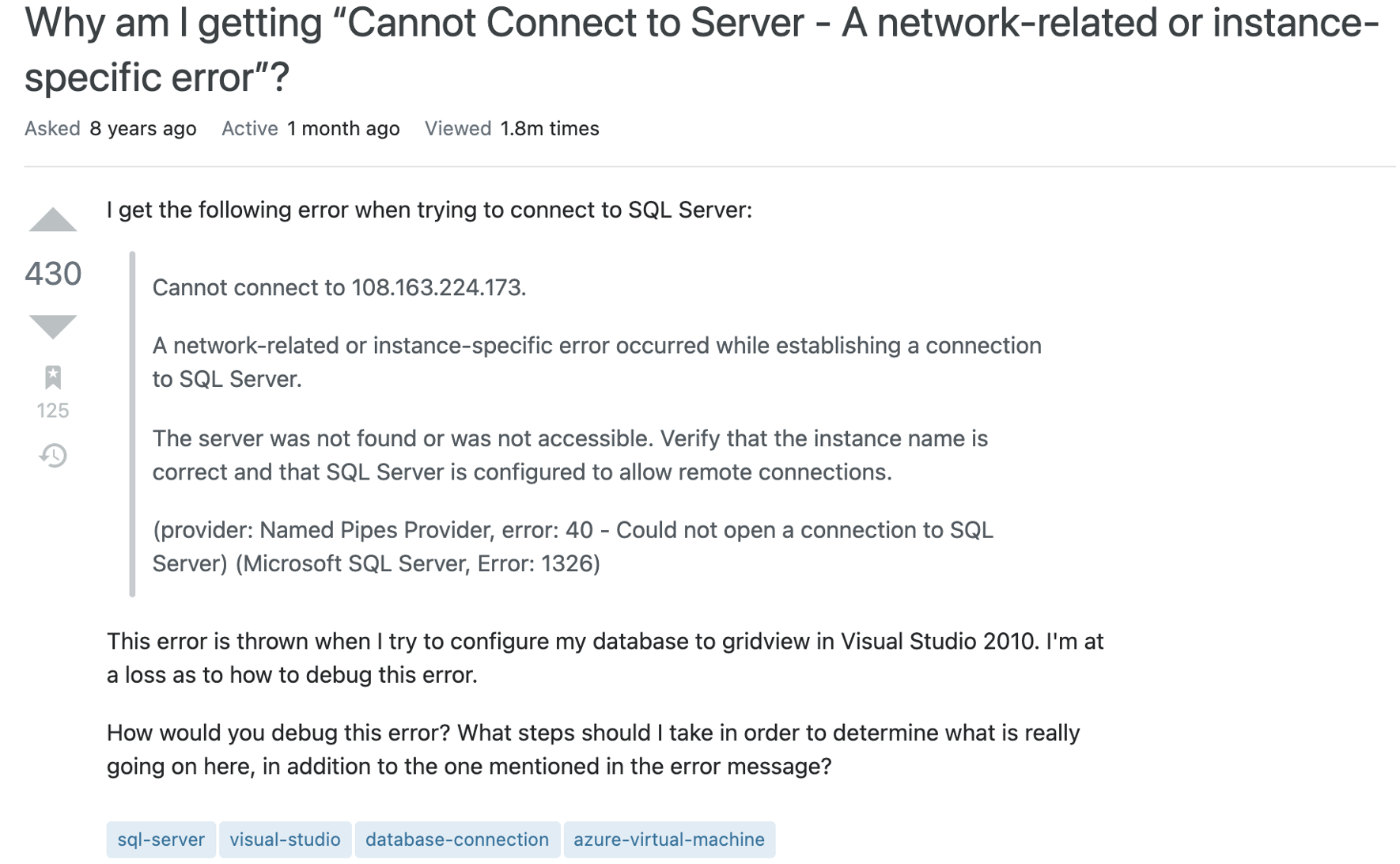
Google Cloud Platform
Total Views: 118,009
The most viewed Google Cloud Platform question is the perfect reminder that restarting your computer or, in this case, your server is always a viable option when troubleshooting.
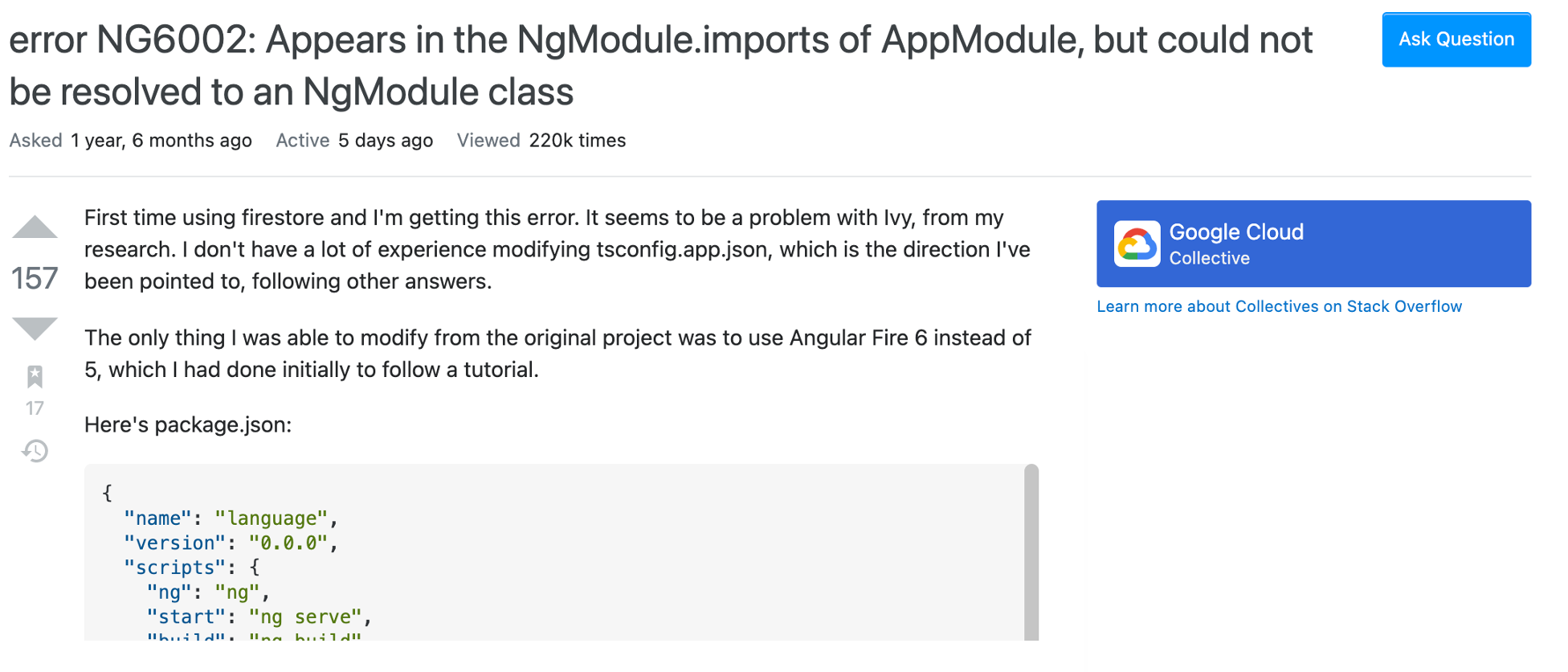
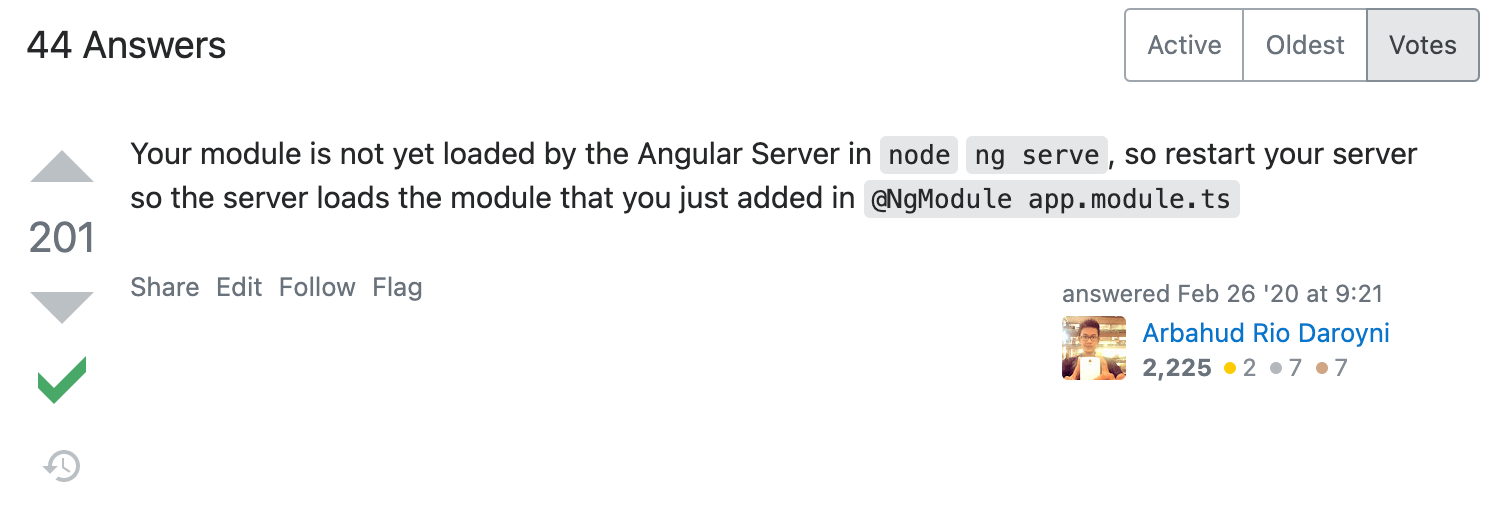
Amazon Web Services
Total Views: 84,930
For AWS, their most viewed question this year was asked less than 12 months ago. So while Azure’s most viewed question was asked eight years ago, this question is a reminder that if you are running into an error, you are probably not alone.
